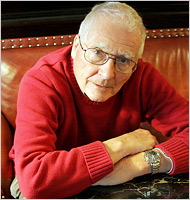
“The scientist James E. Lovelock during an interview at the Algonquin Hotel in New York.” Source of caption and photo: online version of the NYT article quoted and cited below.
(p. D2) Few scientists have elicited such equivalent heaps of praise and criticism as James E. Lovelock, the British chemist, inventor and planetary diagnostician who has long foreseen a clash between humans and their planet.
His work underpins much of modern environmentalism. The electron capture detector he invented in the 1950’s produced initial measurements of dispersed traces of pesticides and ozone-destroying chlorofluorocarbons, providing a foundation for the work of Rachel Carson and for studies revealing risks to the atmosphere’s protective ozone layer.
His conception in 1972 of the planet’s chemistry, climate and veneer of life as a self-sustaining entity, soon given the name Gaia, was embraced by the Earth Day generation and was ridiculed, but eventually accepted (with big qualifications), by many biologists.
Dr. Lovelock, honored in 1997 with the Blue Planet Prize, which is widely considered the environmental equivalent of a Nobel award, has now come under attack from some environmentalists for his support of nuclear power as a way to avoid runaway “global heating” — his preferred alternative to “global warming.”
In his latest book, “The Revenge of Gaia: Why the Earth Is Fighting Back — and How We Can Still Save Humanity” (Perseus, 2006), Dr. Lovelock says that any risks posed by nuclear power are small when compared with the “fever” of heat-trapping carbon dioxide produced by burning coal, oil and other fossil fuels.
For the full interview, see:
ANDREW C. REVKIN. “A Conversation With James E. Lovelock; Updating Prescriptions for Avoiding Worldwide Catastrophe.” The New York Times, Science Times Section (Tues., September 12, 2006): D2.

